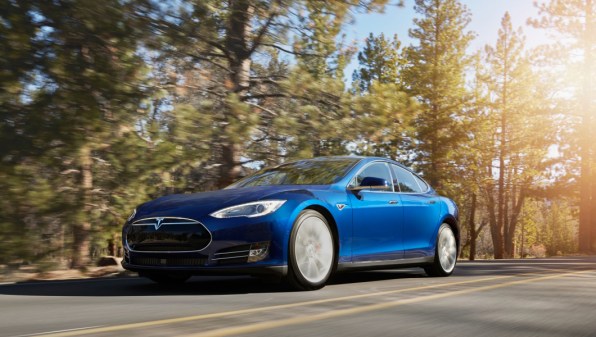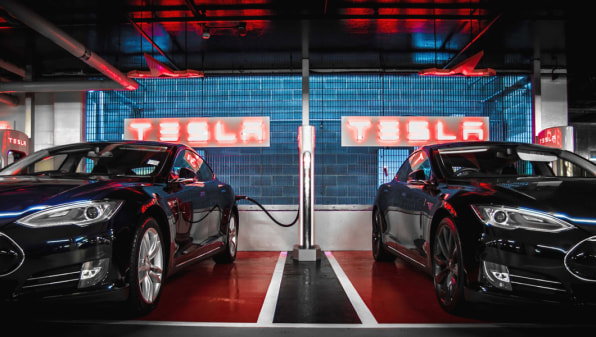Best 6 X 8 Component Car Speakers 2017
If you can say one thing about Tesla, it's that they're hypemasters. The auto company's headquarters in Fremont, California was home to the unveiling of their much-delayed Model X SUV last Tuesday. As CEO Elon Musk MC'ed the event, several SUVs made impossibly sharp turns onstage, showed off their Delorean-style doors, and even hauled an Airstream trailer onstage. Audience members were a mixture of techy auto geeks (team jackets from Google's self-driving car program were very much in attendance) and the Bay Area's upper crust. I spotted at least two very well-dressed attendees making snide remarks to the hired catering help.
The new Model X is an impossibly sleek and sexy car, which is a funny thing to say for an SUV. It's also an indisputable status symbol. A cheap, stripped-down base model retails for a mere $80,000, but most customers will be paying something closer to $130,000. The lucky people driving Model Xes right now pre-ordered the car years ago. If you reserve a Model X now, you can expect to have one in the second half of 2016.
Tesla, and to a far lesser extent other high-end fully-electric cars like the BMW i3 and Mercedes-Benz electric B, are the standard-bearers for electric cars in the mass consciousness. They're the ones that get the envious looks on the highway and the fawning coverage by the press. Newcomers like Apple, with their own electric car program, are almost certainly entering that category. But the future doesn't belong to Tesla…. It belongs to far cheaper, mass-market electric cars like the Nissan Leaf and Ford Focus.

Mass Market Electric Cars
Most electric cars don't require a $130,000 purchase. A 2016 electric Ford Focus begins at a relatively cheap $29,200, and a 2016 Nissan Leaf is $29,000. They represent the entry range for electric cars (rather than a lower cost hybrid), and although not budget priced by any means, are affordable enough to target a large part of the population.
Essentially, electric cars are only available to well-off customers, and primarily usable for customers in urban and suburban areas. Recharging is difficult outside of large cities, suburbs, and heavily traveled routes like California's I-5 in the Central Valley or I-80 in the industrial midwest. But we're not too far away from a future where electric cars are much cheaper, and electric chargers much more accessible.
Sources at the Kelley Blue Book, a car pricing guide, told Fast Company that prices for electric vehicles declined 9.7% compared to 2014, while prices for cars in general had actually increased 1.2%.
Electric Cars Are Getting Cheaper
However, we're not at the point where a usable electric car can be sold for $20,000 just yet. While quite fuel efficient cars can be purchased for below $20,000 new from a dealership, the technology in electric cars still requires a higher price point for automakers to recoup their investment.
When asked about a decreased cost for electric cars, Jessica Caldwell, director of industry analysis for Edmunds.com, said leasing makes electric vehicles affordable for many buyers. "There may not be a $20,000 electric vehicle on the market," she told me, "but after government and automaker subsidies, consumers can lease EVs for very low rates–as low as $139 a month for a Chevrolet Spark. Size continues to be an issue for these inexpensive EVs as most Americans crave something with more space for passengers and cargo."
The massive Tesla Model X, which was stuffed full of luggage clown car-style at Musk's demo, certainly fits that prescription for more passenger and cargo space. But there's a huge market for smaller vehicles–as the smart cars that flood the streets of New York, Boston, San Francisco, Seattle, and Silicon Valley indicate–and all-electric ones are increasingly dropping in price.

Electric Status Symbols
Like many specialty cars, purchasing an electric vehicle is often an intentional choice by a buyer or leaser to signify something about themselves. South Park famously made fun of Prius owners for their "smugness," and marketers have inevitably begun talking about a "Tesla Lifestyle."
Caldwell notes that the Model X is "an opportunity for Tesla to expand its customer base by appealing to more female consumers who make up a strong share of crossover SUV buyers."
That's to be expected. Marketing and branding are as much a part of the automobile game as designing and building vehicles. But there's also an economic aspect that may matter for American customers sooner rather than later. The most ambitious attempt to make electric vehicles commonplace was the failed megastartup Better Place, but they concentrated their efforts in Denmark and Israel. Both countries are extremely small, with extremely high gas prices compared with the United States.
This year, the price of gasoline has been massively volatile in most parts of the United States. Gas prices that were extremely low suddenly surged, and vice versa. On the not-inconceivable occasion of geopolitical unrest or extreme weather in the next few years, gas prices could surge again. All it takes is the war in Yemen getting worse, the Syrian civil war spilling over into neighboring states, or a particularly crappy El Nino season.
For automakers, electric cars are a hedge on future R&D trends and a chance to appeal to a niche urban market. For most customers, electric cars are a handy signifier of a green, high-tech lifestyle. But they might yet become… well, more financially sensible than gas-based vehicles.
Meanwhile, Tesla is planning to begin production of their $35,000 Tesla Model III in 2017. If executed as planned, it could drive down the price of electric cars considerably.
Best 6 X 8 Component Car Speakers 2017
Source: https://www.fastcompany.com/3051872/tesla-and-the-mainstreaming-of-the-electric-car